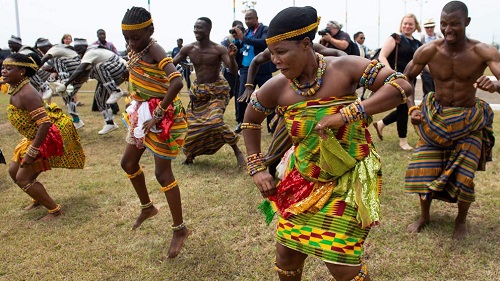
Two hundred and eleven years ago, the British Parliament voted to abolish slavery in British colonies. It, therefore, marks the beginning of a formal end to periods of struggle against human savagery and consequently gives rise to Emancipation Day celebration since August 1, 1834, by the British West Indies and some British Caribbean Africans. Ghana started celebrating the Day since 1998 and makes this occasion an important one on the Ministry of Tourism, Arts and Culture’s annual calendar of events.
The 2019 PANAFEST/Emancipation Day memorial (also known as Year of Return) is christened “Beyond 400 years: Reaching across continents into the future” spans July 20 to August 1, 2019 and seeks to re-ignite the horrors our forebears suffered under the slave trade and to enable the Black Consciousness for the continued struggle against modern forms of slavery as well as subjugation both within and without the African Continent plus the determination to woo and bring the African Diaspora home for development, which the obnoxious slave trade and/or colonialism denied the Continent, through investment.
The Industrial Revolution of North America could have occurred in Africa but for the atrocious colonialism and obnoxious slave trade which looted the Continent’s mineral wealth and human resource for building the imperialist empires.
Inasmuch as the forts, castles and trading posts constantly remind us of the terrible journey across the Atlantic by our ancestors and to today we, as a people, are resolute to say that never again should this human indignation repeats itself, we must work hard to achieve continent-wide economic transformation for the benefit of our people.
Until human progress is made a reality in Africa, coupled with stemming of tides of poverty, disease and squalor, the annual celebration of the PANAFEST/Emancipation Day will be meaningless and the living hell of the “middle passage” and the life of unremitting toil on the plantations, as the disposable chattels of fellow human beings, cannot be redressed.
The slavery abolition we commemorate today, as Emancipation Day, was a welcome event but the question we should be asking in this contemporary moment is why Britain abolished it more than two centuries ago as well as the reason for tolerating the slave trade for so long. Interestingly, the economic value of slaves is obvious enough.
The New World plantation created demand for labour, and the “triangular trade” – where the same ships which carried European merchandise to Africa were used to transport Africans to America, plus commodities produced – was profitable.
The economic justification, however, is hardly a sufficient explanation for its prevalence because after all, slavery runs counter to some of the most fundamental enlightenment values in Europe and America. Perhaps, the slave trade throve because it was hidden from many Brits and the production of goods and services by slaves were largely unknown to the British public.
It was when the cruelty and violence were exposed through publications by the abolitionists that the slave trade abolition eventually prevailed. As we celebrate the PANAFEST/Emancipation Day, it is crucial to honour the Pan Africanist heroes namely, W.E.B. Du Bois, Marcus Garvey, George Padmore, Dr Kwame Nkrumah and many others whose efforts led to the freedom we all enjoy today.
Relevance
The African Continent must move on despite her volatile history. Yes, the Continent lost a lot to slavery and colonialism yet we have to strive hard to attain progress. The economic transformation of the Continent must be collective efforts aided by the Diaspora.
Let us strengthen the PANAFEST/Emancipation programmes for the purpose of wooing the people of African descent to return home and invest their resources in the African Continent. Continent-wide leadership should initiate steps to establish longer-lasting relationships with the Diaspora to begin the dialogue for homecoming.
Again, the slave trade’s injustices can be seen and felt in our everyday lives, and the earlier they are dealt with the better for the continental advancement.
Domestic slavery, violence against women and children are not uncommon in our societies, social dislocation and other vices are current fixations which nullify the Emancipation Day commemoration.
Besides, the middle class must be empowered to be responsible and accountable to themselves and their societies because it is the only way social capital is built for national development. Thus, a poor and irresponsible middle class is a liability for nation-building and social capital formation for national transformation.
Programmes
The programme lined up for the celebration of the 2019 PANAFEST/Emancipation Day includes Assin Praso River Crossing, Wreath Laying Ceremony, Ghana Diaspora Engagement, Akwaaba Ceremony in Elmina Castle Dungeons, “Year of Return” Grand Durbar, Opening of Colloquium, the Reverential Night at the Cape Coast Castle, and the Emancipation Day (Assin Manso) – Bath and Wreath Laying Ceremony; the Grand Finale on August 1, 2019.
The Ministry of Tourism, Arts and Culture, therefore, invites all and sundry to participate in these special events and other cultural festivals to continue to enforce its commitment to making Ghana the Gateway to the African Homeland for our kinsmen who are living in the Diaspora.
There is no doubt that the visit to the various slave sites and relics such as Salaga, Gwollu, Bono Manso, Elmina, Cape Coast, Assin Manso, Assin Praso among others in the country would help boost domestic tourism which is dear to our hearts.
By DR. ALPHONSE KUMAZA
The writer is a Senior Tourism Officer
Ministry of Tourism, Arts and Culture



